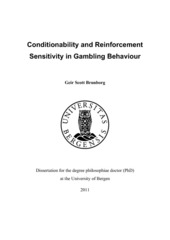Conditionability and Reinforcement Sensitivity in Gambling Behaviour
Doctoral thesis
Permanent lenke
https://hdl.handle.net/1956/5369Utgivelsesdato
2011-12-12Metadata
Vis full innførselSamlinger
- Faculty of Psychology [521]
Sammendrag
Models of the antecedents of pathological gambling (PG) include the processes of classical and instrumental conditioning. After experiences with gambling, appetitive classical conditioning can lead to a learned relation between the gambling environment and excitement, and this excitement can subsequently become a conditioned positive reinforcer for continued gambling behaviour. The gambling environment can also become associated with negative feelings through the process of aversive conditioning, and these negative feelings can serve as conditioned punishment, ultimately leading to the avoidance of gambling. Gambling involves both positive reinforcement and punishment, and operates on a variable interval reinforcement schedule that makes gambling behaviour difficult to extinguish. Differences in the degree to which individuals acquire classical conditioning (conditionability), and differences in the degree to which individuals approach and respond to instrumental conditioning (reinforcement sensitivity) are understudied in relation to gambling behaviour. The studies reported in this thesis further investigated conditionability and reinforcement sensitivity in relation to gambling behaviour. The first aim was to investigate whether individual differences in differential aversive classical conditioning and reinforcement sensitivity were associated with risk-avoidance on a gambling task. The second aim was to also to include appetitive conditioning in order to investigate if aversive conditioning, appetitive conditioning and reinforcement sensitivity could explain differences in risk-taking during gambling. The third aim was to investigate whether PGs would show diminished conditionability by comparing them with a control group. Three studies were conducted in order to achieve these aims. The first study employed a differential aversive conditioning paradigm with skin conductance as the outcome measure. The results showed that a group of student participants did not show aversive conditioning, and furthermore that this group showed less risk-avoidance when gambling on the Iowa gambling task. No association was found between reinforcement sensitivity and risk-avoidance, therefore it seemed that aversive conditioning alone could contribute to explaining variation in risk-avoidance. The second study employed an evaluative conditioning paradigm where both appetitive and aversive evaluative conditioning was measured. The results showed that the student participants who did not show appetitive nor aversive conditioning showed less risk-taking on a purpose built simulated slot machine designed to be more similar to commercially available gambling products than the Iowa gambling task. Furthermore, the student participants who had low scores on both self-reported reward responsiveness and punishment sensitivity (i.e. fight-flight-freeze system) also showed less risk-taking when gambling. In the third study, a group of PGs were compared to a control group on a differential aversive classical conditioning paradigm where heart rate responses comprised the outcome variable. The results showed that the PG group showed diminished aversive conditioning compared to the control group. These results combined suggest that the effects of the processes of classical and instrumental conditioning for gambling behaviour are contingent on individuals’ conditionability and reinforcement sensitivity.
Består av
Paper I: Brunborg, G. S., Johnsen, B. H., Pallesen, S., Molde, H. Mentzoni, R. A., & Myrseth, H. (2010). The relationship between aversive conditioning and risk-avoidance in gambling. Journal of Gambling Studies 26(4): 545-559, February 2010. Full text not available in BORA due to publisher restrictions. The article is available at: http://dx.doi.org/10.1007/s10899-010-9178-0Paper II: Brunborg, G. S., Johnsen, B. H., Pallesen, S., Mentzoni, R. A., & Molde, H. (2011). Individual differences in evaluative conditioning and reward responsiveness affect bet-size in gambling. Personality and Individual Differences 50(5): 729-734, April 2011. Full text not available in BORA due to publisher restrictions. The article is available at: http://dx.doi.org/10.1016/j.paid.2010.12.026
Paper III: Brunborg, G. S., Johnsen, B. H., Molde, H. Mentzoni, R. A., & Myrseth, H., E. T. Bu, Lorvik, I. M. & Pallesen, S. Diminished aversive classical conditioning in pathological gamblers. Full text not available in BORA due to publisher restrictions.
